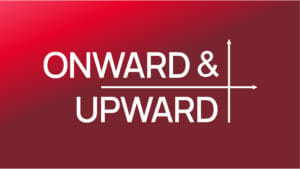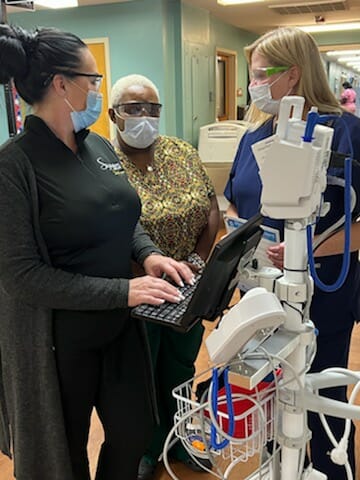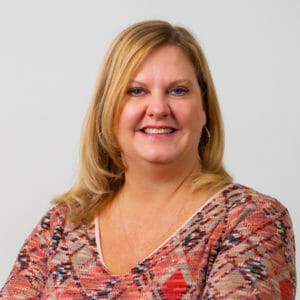Amid a nationwide staffing shortage, Signature HealthCare has undertaken a major effort to redesign care delivery, an effort Chief Nursing Operator Barbara Revelette, RN, MSN, says benefits caregivers as much as patients.
The process is eliminating duplicative and often burdensome processes that eat into time spent at the bedside, thus creating a streamlined workflow that drives job satisfaction and better patient outcomes.

“Our goal is to build effective efficiencies through technology, job redesign and utilizing the lean process where we’re able to focus on minimizing unnecessary excesses in a variety of processes, procedures and tasks,” Revelette told McKnight’s Long-Term Care News. “By redesigning the care delivery in our homes, we’ll enable our nursing teams to provide the optimal level of care our residents deserve — and our nurses desire and deserve to give that care.”
Among the focus areas are coordinating nursing care with other in-building and consulting clinicians, better engaging residents and family engagement and integrating ancillary services support. There’s also a focus on better educating and training nurses on technology, including improved electronic health system efficiencies.
The effort has already led to “significant strides” in decreasing the time it takes for documentation and simplifying how information is input and shared across needed platforms. In one pilot, Signature is using a system that allows hemodynamic vitals to be submitted electronically to the EHR without the need for a nurse to stop at a computer.
Changes are being evaluated for each frontline role, from the CNA to nurse leaders.

For Revelette, who started as a CNA more than 25 years ago, that includes walking the floor with caregivers during their daily routines and mentoring new DONs as they hit the floor. Others on the Signature team are doing the same, and in the process identifying physical changes that can reduce workers’ time spent moving through a building or gathering needed equipment.
“By aligning all these facets of care delivery, we’ll be able to create a process by which our facility teams can function at the most efficient level,” Revelette noted.
Increasing clinical capacity
Signature isn’t focusing solely on nurses as it builds its clinical capacity. Part of enabling CNAs, LPNs and RNs to work at the top of their license is providing programs and a network of providers who can track and improve patient conditions.
“The patients we’re seeing right now are more medically complex. They have more comorbidities,” Revelette explained. “So we’ve looked at the changing needs and are responding to them in our redesign.”
Among key features in the Signature model are engaged medical directors and partnerships that provide facilities with nurse practitioners and physician assistants in buildings five days a week through regular assignment or from a shared hub.

“Having these services helps with mitigating unnecessary returns to hospital and addresses patients’ needs more quickly and efficiently,” Revelette said.
Advanced practice clinicians also provide critical medication management review to reduce polypharmacy; guide patients with certain diagnoses through risk-based pathways; and participate in building-level QAPI projects.
“They focus on key geriattric aspects of care, such as medication optimization and advanced care planning and transitional care issues that aren’t necessarily seen when you just come in and do your history and physical,” she noted. “They’re not just present just on a mission or for the regulatory requirement for medical documentation. Our providers are available and willing and truly believe that’s how we provide the best care to our residents.”
Expanding higher-level services
Signature also continues to grow its clinical capabilities at the program level.
An in-house dialysis program that began before the pandemic has led to the establishment of 14 dialysis dens.
Meanwhile, the company has hired more than 100 respiratory therapists over the last three years to improve and expand its pulmonary services. Despite national hiring challenges industry-wide, Signature has been able to attract candidates through a broad program that allows therapists to be a resource for the patients.
“A respiratory therapist goes to school and they learn tasks, they learn procedures, they learn technique. But we’ve built into our program that they have the time to spend with our residents to look at disease management and the person as a whole,” Revelette said. “I think respiratory therapists are attracted to that, to being able to work truly with the resident not just to deliver the modalities or the procedures or nebulizers they need, but to improve their overall state.”
Across its programs and buildings, Signature also is looking to technology that can ease the job and better predict needs of patients. That effort is often led by medical directors, who are expected to help identify community needs, trends and innovative solutions.
The company is currently piloting a vendor-based tool that scrubs narrative notes inside the EHR as a way to gain additional patient insights.
“It allows you to have early warning signs so that if a condition changes, you can absolutely go in and look at that model. Has there been a change in their vital signs or their care needs or eating or other body systems?” Revelette said. “The capability to address medical complexity truly in the future is to integrate remote patient monitoring.”




